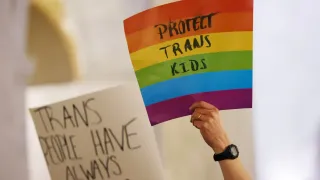October 17, 2016
LGBT History Month :: Josephine Baker and Terrance McNally
READ TIME: 4 MIN.
Each year, along with the help of Equality Forum and LGBT HistoryMonth.com, Hotspots celebrates LGBT History Month by honoring members of the community who are advancing our rights, fighting for visibility, and who help move us forward towards a life where everyone feels free to live life as who they really are.
This week, we honor Josephine Baker, an African American entertainer who found fame in France. We also honor American Playwright Terrance McNally, who has written extensively about LGBT issues and has won top awards in his field including an Emmy and a Tony.
Josephine Baker
Born: June 3, 1906
Died: April 12, 1975
Josephine Baker was an American-born entertainer who found fame as a dancer, singer and actress in Paris. Sometimes called the "Jazz Cleopatra," Baker was born Freda Josephine McDonald in a poor neighborhood in St. Louis, Missouri. After facing abuse and racial discrimination in America, she moved to France in the 1920s where she became a celebrated performer and the first black woman to star in a major motion picture. Her exotic beauty inspired Ernest Hemingway to describe her as "the most sensational woman anyone ever saw."
Baker's landmark cabaret show, "La Revue N�gre," became the toast of Paris thanks to her on-stage antics. She exuded sexuality, wearing next to nothing and performing tribal-inspired dances with comic touches and cultural commentary.
When she returned to the United States as a major star a decade later, the reception was quite different. American audiences rejected her, and The New York Times called her a "negro wench." She went back to Europe brokenhearted.
During World War II, Baker earned recognition performing for troops and smuggling secret messages on music sheets for the French Resistance. She also served as a sub-lieutenant in the Women's Auxiliary Army. She was honored with the Croix de Guerre and named Chevalier of the Legion of Honor by the French government.
In the 1950s and '60s, Baker again faced racial discrimination in America, where the most popular clubs prohibited her from performing. She publicly criticized the Jim Crow laws that enforced segregation and refused to perform in segregated clubs. In 1951 Baker was honored for her activism by the National Association for the Advancement of Colored People (NAACP), which declared May 20th Josephine Baker Day.
Baker talked publicly about racial equality in France and segregation at home. She spoke at the March on Washington in 1963 alongside Dr. Martin Luther King.
Baker married and divorced four times and adopted 12 children of varying ethnic backgrounds, which she called "The Rainbow Tribe." One son later described his mother as a bisexual, noting a relationship she had with the Mexican artist Frida Kahlo.
Baker also has been linked romantically to the novelist Colette, fellow expatriate performer Bricktop and other women.
Baker became a citizen of France, where she remains an icon. In 1991 HBO released "The Josephine Baker Story," which earned five Emmys and a Golden Globe.
Terrance McNally
b. November 3, 1938
Terrence McNally is an award-winning American playwright whose career spans five decades. His work, which delves into themes of family, war, sexuality and religion, has earned him four Tony Awards.
Raised in Texas, McNally moved to New York City to attend Columbia University. His first job was as a tutor for John Steinbeck's children. During this time, McNally wrote his first play, and Steinbeck asked him to write the libretto for the musical based on his novel "East of Eden."
McNally spend much of his early career writing and submitting works to theater companies around the country. At the famous Actors Studio, he met the playwright Edward Albee, with whom he became romantically involved.
McNally's first play was a flop, but he went on to write several successful off-Broadway shows, including "Witness" and "Sweet Eros." His breakout, "Frankie and Johnny in the Clair de Lune," was later adapted into a film starring Al Pacino and Michelle Pfeiffer. Several of McNally's plays have been adapted for the screen.
McNally's "Lips Together, Teeth Apart," about two married couples who spend a weekend on Fire Island, is a landmark play about AIDS. McNally also explored gay themes in the book for the musical "Kiss of the Spider Woman," for which he won his first Tony Award. His play "Love! Valour! Compassion!" earned him another Tony Award for its portrayal of eight gay men facing issues of fidelity, love and happiness. In 1996 McNally was inducted into the American Theater Hall of Fame.
McNally's controversial play "Corpus Christi" depicts a modern-day Jesus as a homosexual. The Manhattan Theater Club, the first company to consider staging it, received death threats and temporarily canceled the production before enjoying a successful run. The play continues to spark controversy.
In 2014 McNally's play "Mothers and Sons" opened on Broadway. It explores the relationship between a mother and her dead son's former gay partner. The play revisits McNally's 1990 television movie, "Andre's Mother," for which he won an Emmy Award.
McNally and his partner, Thomas Kirdahy, married in Vermont in 2003, and again in Washington, D.C., in 2010. McNally's collection of works and notes are held in an open archive at the Harry Ransom Center at the University of Texas at Austin.
For more information on Baker and McNally, visit LGBTHistoryMonth.com. There, you can find videos and more information about hundreds of other LGBT heroes.
 Copyright HotSpots! Magazine. For more articles from HotSpots! visit
Copyright HotSpots! Magazine. For more articles from HotSpots! visit 





